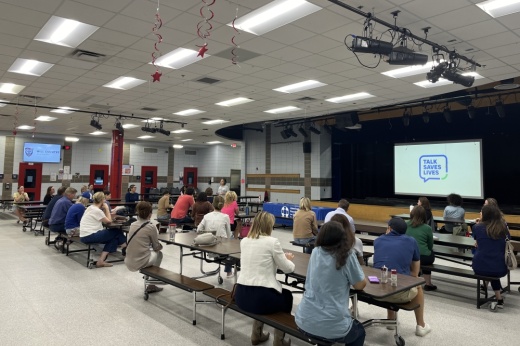Licensed clinical social worker Laura Hernandez Gold presented Talk Saves Lives, which covered the latest data on suicide in the U.S. and world, common risk factors, suicide prevention strategies, and more.
Something to know
According to Gold, suicide is one of the leading causes of death in the U.S.—there are more suicide deaths than homicides, car crashes and natural disasters—and said that someone dies by suicide every 11 minutes, although this is "likely an underestimate."
Gold also said that language matters and that people should avoid saying "committed suicide" or "failed/successful attempt." Instead, say "died by suicide" or "ended their life."
Who it affects
Gold said that a variety of factors play a role in why someone might be suicidal, not just those with mental health conditions.
Physical health factors, such as chronic health conditions; historical factors, such as a family history of suicide, previous suicide attempts or abuse; and environmental factors, such as stressful life events or access to lethal means to end their life, can all play a part, Gold said.
Gold also said to be aware of changing behavior in someone you think may be suicidal, such as:
- Reckless behavior
- Withdrawal from activities
- Isolating from family and friends
- Giving away possessions
- Sudden, unexplained happiness
When reaching out to someone you think might be at risk, Gold said to avoid:
- Minimizing their feelings
- Convincing them that life is worth living
- Giving them advice on how to "fix" it
- Speak privately
- Express your concern and caring
- Ask directly about their suicidal thoughts
- Listen
- Encourage them to seek help
Gold said these strategies include limiting access to lethal means, such securing firearms; discarding expired or excess medications, or getting a medicine lockbox; and installing carbon monoxide sensors in vehicles.
Keep in mind
Per the presentation, a variety of mental health resources are available for 24/7 assistance, including the 988 Suicide & Crisis Lifeline and the Crisis Text Line. The 988 Lifeline can connect people to local crisis centers in their state, and the Crisis Text Line will connect to a trained crisis counselor.
Gold recommended saving the numbers in your phone contacts with an "A" in front of the name so they show up at the top of the list and are easy to access.
- For the 988 Suicide & Crisis Lifeline, dial 988 and press 1 for veterans or 2 for Spanish, or text 988 (English only)
- For the Crisis Text Line, text TALK for English or AYUDA for Spanish to 741741





